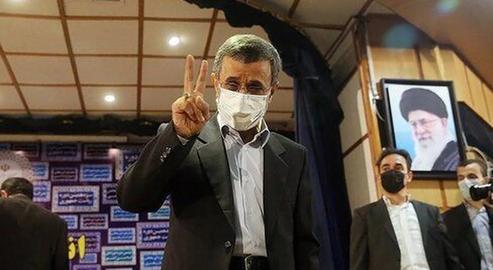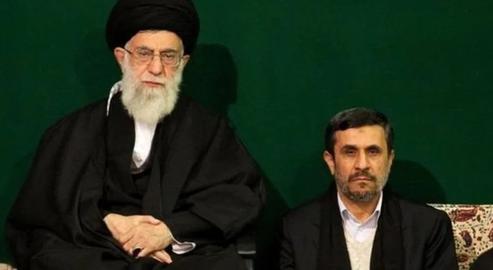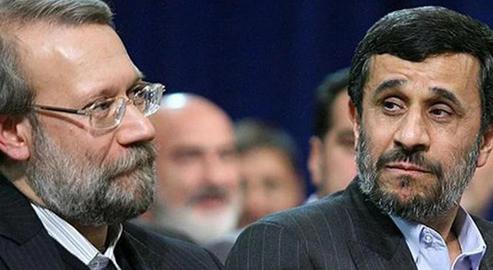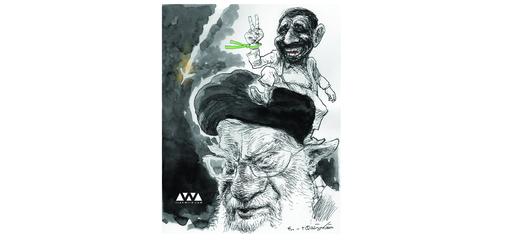Yesterday Mahmoud Ahmadinejad, Iran’s former president from 2005 to 2013, arrived flanked by his entourage and crowds of onlookers at the Ministry of Interior to register as a candidate in the country’s 13th presidential election.
Just like his eight-year premiership, it was a headline-grabbing episode - particularly after some of his supporters scuffled with Ministry staff on not being allowed into the building alongside him.
At first glance, however, the gesture appears to be a futile one. Back in 2017 Ahmadinejad also registered despite the fact that Supreme Leader Ali Khamenei had already barred him from running for office. The Guardian Council promptly threw out his candidacy and his presence is even less welcomed by conservatives in 2021. In light of this, what was Ahmadinejad thinking by re-registering again?
****
Fewer than 24 hours after Ayatollah Khamenei proclaimed he would not be commenting on individual candidacies, Mahmoud Ahmadinejad arrived at the Interior Ministry amid the expected hullaballoo to sign up for consideration.
On Tuesday, May 11, the Supreme Leader had told a group of students: "I do not interfere in the selection of individuals. In the past, people who wanted to run for office would ask me for my opinion. I said I neither agreed nor disagreed; I mean, I have no idea. But during this period, I won’t even say that much.”
The remarks prompted some immediate bemusement in cyberspace. Iranian social media users recalled Khamenei’s previous discouragement of Hassan Khomeini in 2021, and Ahmadinejad in 2017, which led to both either withdrawing or being disqualified from the race.
Speaking to the media on Wednesday, Ahmadinejad made a veiled reference to this, saying: "It is against the interests of the country and the people for some to strive for electoral engineering, to tell people not to come out, and to stop them from entering the [political] arena under false pretences."
He added that the 2021 presidential election might yet be the “last chance” for the Islamic Republic to maintain its grip on power. "Passionate elections have become a hollow concept,” he said. “They call it revolution: this is a huge, fundamental divergence.”
Self-Preservation While Reigniting Controversy
The second term of Ahmadinejad’s presidency was marked by non-compliance, political tumult and clashes with Iran’s unelected establishment. Among the highlights were his abrupt 11-day disappearance in 2011, the dismissal of his Minister of Intelligence without coordination with Ayatollah Khamenei, and a ferocious attack on the judiciary under Sadegh Amoli Larijani.
The former president of Iran has now become more isolated in the political arena compared to in 2017. During this period, Hamid Baghaei and Esfandiar Rahim Mashaei, his two closest allies and friends, have also been imprisoned. Nonetheless, he showed up to register.
Prior to registration, Ahmadinejad is sure to have caught Guardian Council spokesman Abbas Ali Kadkhodai saying he would be disqualified if he tried to enter. But by announcing his political ambitions, he is trying to remain a political actor.
In recent years Ahmadinejad cleaved to his own dwindling legacy in Iranian public opinion, and the memory of the popular support he once enjoyed among members of the working class. This may be partly on the basis that if he exits the political sphere for good, the state could deal with him as harshly as it has other transgressors.
Moreover, a number of both principlist and reformist political figures sincerely believe Ahmadinejad would still amass a large voting base were he to be approved. Iranian academic and analyst Sadegh Zibakalam has even ventured that he might garner 15 million votes.
Ahmadinejad’s public attacks on Larijani made waves in 2017. They were useful, too, given that a project to marginalize Larijani was already well underway, under the auspices of the office of the Supreme Leader of the Islamic Republic. The likely appearance of Larijani in this fresh round of electoral registration gives Ahmadinejad a good opportunity to build on his reputation as a slanderer, a peddler of controversy – but also as a driver of change.
Even while registering with the Interior Ministry, Ahmadinejad mocked the Larijani brothers by claiming that he had a "pure Iranian identity card" while they were born in Najaf.
Playing a Long Game
In late April 2021, the IRGC-affiliated Tasnim News Agency quoted a hardline analyst as saying that Ahmadinejad was not truly seeking approval from the state, but preparing for a time when Iran’s governance structure changes by creating a new strain of internal opposition.
There are also some similarities between the candidacies of Ahmadinejad and reformist Mostafa Tajzadeh. Although far apart on the political and ideological spectrum, both are fundamentally critical of Iran’s unelected institutions and believe in root-and-branch change to how the country is run. Both know they are highly likely to be disqualified, but intend to use the platform afforded to them by registration to make a point.
Ahmadinejad may also have half an eye on the prospect of a change in his own political station under Khamenei’s successor. For the time being, though, his presence is far from welcome in official and principlist circles. Last March Gholam-Ali Haddad-Adel, chairman of the Council of the Coalition of Revolutionary Forces, advised Iran’s conservatives to pay no attention to either chatter in cyberspace or Ahmadinejad’s potential candidacy.
Ahmadinejad has also made threat of not voting – and encouraging others to boycott the vote – if he ends up being disqualified. But how far this would make a chink in the overall result, especially in the unprecedentedly chilly 2021 pre-electoral atmosphere, is uncertain.
Related coverage:
Ahmadinejad Registers as Presidential Candidate
Guardian Council Bypasses Parliament to Change Iran's Election Rules
Speaker of Parliament Implicated in Iran's Budget Manipulation Scandal
Khamenei.com: Disenfranchising the Parliament, Part Six
visit the accountability section
In this section of Iran Wire, you can contact the officials and launch your campaign for various problems



























comments